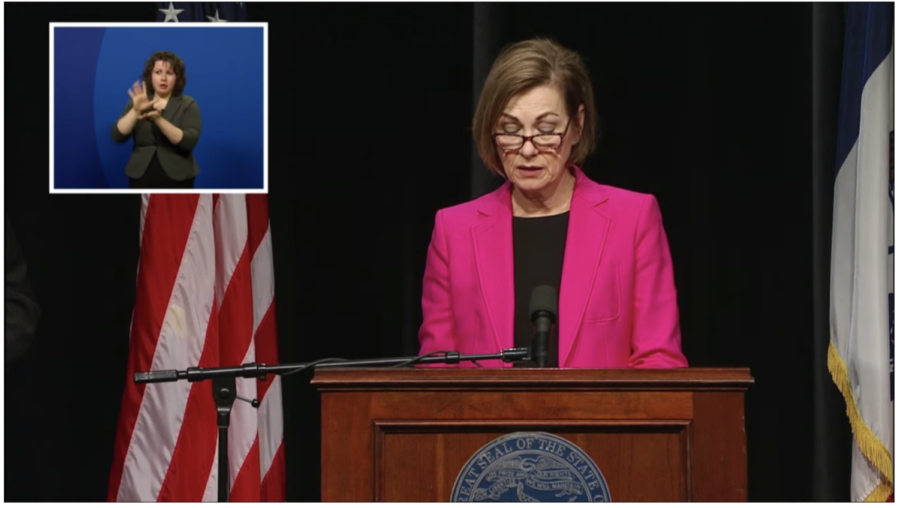Kim Reynolds addresses delta variant and vaccine effectiveness
Gov. Kim Reynolds informing Iowans on COVID-19 vaccine updates during Wednesday morning’s press conference.
September 2, 2021
Gov. Kim Reynolds’ office relaunched their COVID-19 information website after scaling back on reporting in July.
In a press conference Thursday, Reynolds reported that the delta variant is now responsible for 99 percent of new cases in Iowa. She also stated that 79 percent of those hospitalized are unvaccinated. Vaccination rates for Iowans 12 years and over is 66.4 percent and the rate for Iowans 65 years and over is 91 percent.
Director Kelly Garcia of the Iowa Department of Health and Human Services provided additional information regarding Iowa’s COVID-19 dashboard. She said that the frequency of data reporting was scaled back in July to once a week.
However, due to the delta variant, reporting will now be increased to Monday, Wednesday and Friday for the most important information. The dashboard will now also include the vaccination rates of those hospitalized and positivity rates over time. Garcia echoed Reynolds’ message of getting vaccinated and staying educated.
“Especially with the vaccine available, the rise we’re seeing isn’t cause for panic, far from it, but it is a good reason to consider what you can do to help,” she said.
The 7 day average for positive COVID-19 tests in Iowa has increased from 84 July 1 to 1,187 Sept. 1, according to the New York Times. In total, 408,390 Iowans have tested positive for COVID-19 and 6,307 Iowans have died from it.
“The virus, it’s here to stay, which means that we need to find a way to live with it in a responsible, balanced and sustainable way,” Reynolds said.
She maintained her position that neither vaccines nor masks in schools should be mandated. She also addressed the rise of the delta variant, saying that it is an issue but not a cause for panic because of the vaccine.
“Iowans care about the common good,” Reynolds said. “They are capable of making their own informed decisions about their health and they deserve the respect from their leaders to allow them to do so.”
When asked how she would increase vaccination numbers if many Iowans refuse to get it despite these facts, Reynolds responded that she doesn’t know individuals’ health decisions and that Iowans should talk to their physician. Reynolds is vaccinated, and she recommends it, but she said people should make informed decisions because that is a more effective solution than mandates.
On the topic of kids returning to school, Reynolds said that Iowa led the nation in getting kids back to class safely last year and would do it again. She also brought up the fact that 2 percent of patients hospitalized with COVID-19 are under 18. If there was to be an outbreak at a school, Reynolds said that the state would not be tracking it and that it would be up to the school district if they want to report it or not.
When asked what she would say to parents of at-risk kids, Reynolds said that there is still an online option, and they should talk to their doctors. She also said that they are allowed to send their kid to school with a mask. She then suggested that masks can negatively affect children’s ability to learn, and there is data on both sides, for and against mask-wearing.
Both Reynolds and Garcia stressed the importance of the vaccine but made it clear that the state would take no action to ensure Iowans get the vaccine beyond making the information more available.

















